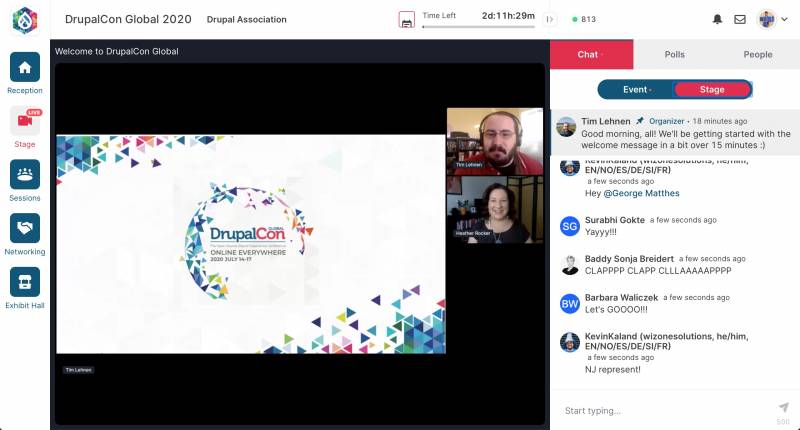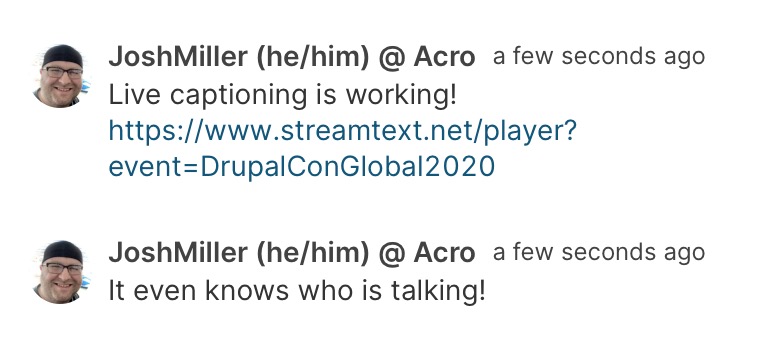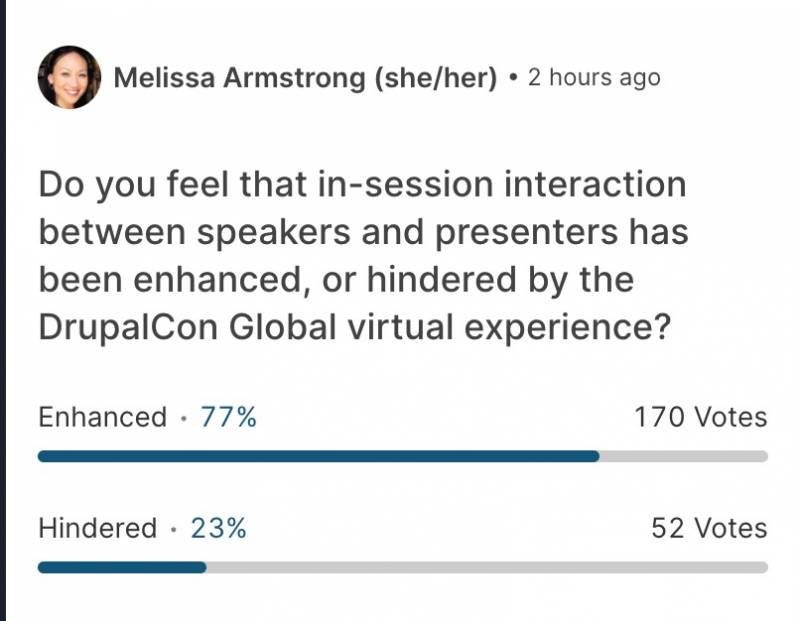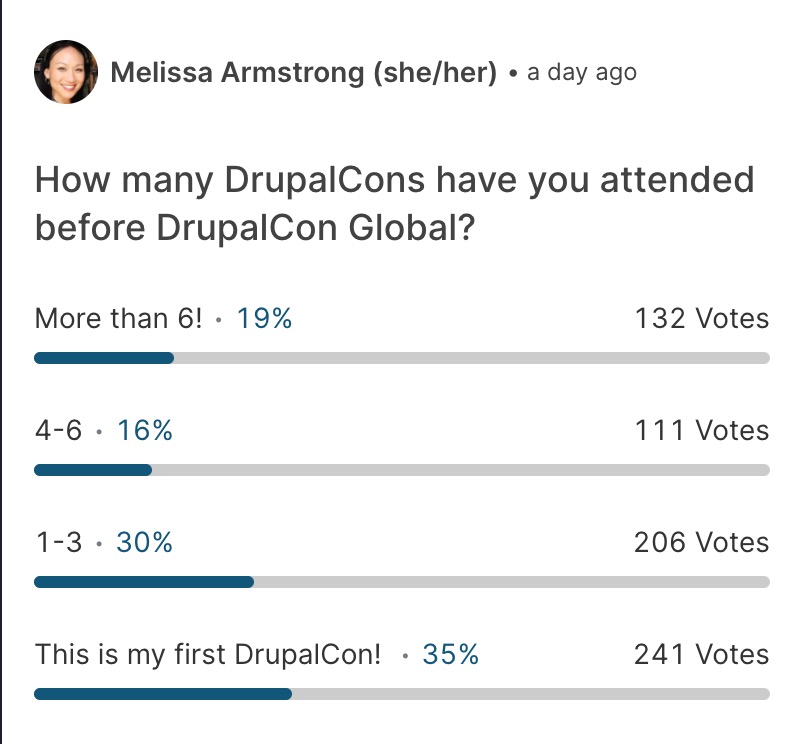Last week wrapped up DrupalCon Global 2020, the first virtual edition of the biggest Drupal learning and networking event in the world.
Like pretty much everything in 2020, things are different this year and will be looked on in the future with an asterisk. When sports teams win their championships this year, there will be a little footnote at the bottom of future statistics books noting that they won in 2020, the year of the pandemic. The team won, but under strange circumstances, so maybe consider it a different win than other years.
I think we'll be talking about this DrupalCon in the same way for years to come. With an asterisk. Not because it was a failure (it certainly wasn't — it was a huge success), but because it will influence future DrupalCons.
If you've read any Twitter threads or other blog posts about this year's conference, you'll probably hear, "It was a great virtual conference, but it just wasn't the same as real life."
Totally agree. But I'm going to break down the different aspects of the 'Con:
Technical
This year's conference used Hopin to manage the video and chat for the stage, sessions, and exhibition hall. I had never used Hopin before, but the signup process via the Drupal Association's emails were seamless.
On the morning of July 14, before the conference got started, there was already some buzz. On the right-hand side of the screen was a chat window that everybody at the conference could see. On another tab was a list of polls people could answer, and you could see a list of all the people that were attending the conference.
Like a real-life conference, you could "walk" (i.e., click) to a different hall and see what's going on. There was a main stage, session rooms, the exhibition hall, and a Networking tab which mimics the halls of a real conference where you meet folks. The Networking tab allowed you to be matched up with a random person and chat.
Now, this isn't how networking in real life works: in reality, you get introduced by somebody else or some eye contact is made and a conversation isn't initiated. So at first glance, the Networking tab doesn't mimic how conference networking happens. But there's an advantage to this I didn't see before writing this: I might get matched up with somebody I wouldn't think to approach at an in-person conference.
And maybe that's a lesson to learn: our networking software doesn't need to mirror the real-world exactly for it to be better.
Video and Sound Quality
At 9:30 AM ET, the conference officially began and our opening speakers, Tim Lehnen and Heather Rocker took the stage... from their homes. The video and sound quality was fantastic with just the two of them on stage. I'm sure mountains of rehearsals took place, but there was never seemingly any large lag or awkward "Could you repeat that?" or "Can you see my screen?"

Less than two minutes after starting, more than 800 people were watching. And it held up. So too during the sessions.
I did have issues with the video when there were lots of people sharing their video at the same time, such as in BOFs ('Birds of a Feather', essentially small groups that gather together to discuss a shared topic of interest), This was not a limitation of Hopin, but I think of my 2015 MacBook Pro laptop. Fans ran wild.
Having a bunch of people hanging out in a room adds a nice personal feeling. But maybe a recommendation for the future: when you get more than 6 people in a session, tell all but two people to turn off their video.
Chat
In brief: the chat worked well. There was an ever present chat for the entire conference which you could join, but then also a chat just for the session itself. Thumbs up.
Live Closed Captioning
A welcome addition to those with hearing difficulties, each session had live captioning provided by StreamText. Although I personally didn't have a need for it, it's fantastic that this was available and is now expected as default at conferences. The captions not only showed what was said, but also who was talking.

Browser Issues
My primary browser is Safari. When visiting the Exhibition Hall, I ran into a bug where it would auto-scroll through all of the sponsors and the page became unresponsive. Not the Drupal Association's fault (they don't operate Hopin), but it's still surprising to me that web services built these days aren't built for all browsers.
I didn't try on my phone or tablet, but from what my colleagues told me, the experience on an iPhone was less than ideal.
Overall
After comparing notes with my colleague Suzanne, who was a presenter at DrupalCon and was also presenting at another online conference the same week using another tool called MaestroConference, Hopin clearly has a lot of the virtual conference experience features figured out. There's room for improvement, but this is way better than being on a series of Zoom calls all day long.
Session Experience
The meat of a DrupalCon are the sessions where you get to learn new things. How did it fare this year?
As an attendee, I actually preferred this format! The presenter showed their video and their slides, either of which I could enlarge if I clicked on them, but the user chat was the best part: in real-time the audience could provide commentary and share tips. So if the presenter mentioned a module or a project, somebody in the chat would usually link to it. If somebody asked a question in the chat that was directed generally, somebody would usually answer.

As a presenter, I could see a river of comments being distracting. Also: there was no obvious feature to share a comment as a question saved for the end, which would be a big help for the presenter. Also, threaded comments would have been useful to help organize the conversation.
BOF Experience
Even as somebody who has gone to many DrupalCons, I still felt nervous about speaking up in BOFs (Birds of a Feather), especially if one of the people leading the session was somebody with notoriety in the community.
With this year's format, I felt way more comfortable joining in. You could join a BOF and just type in the chat section, or you could share your mic and video and be a "presenter" in the BOF. I did this several times and didn't feel the nervousness that I usually felt in normal conferences.
Maybe it had to do with wanting to support the person leading the BOF and if I chimed in with my video it made their job easier? Whatever it was, the intimidation did not feel so high this time around.
One of the first BOFs I attended was discussing the role of the Classy base theme in future versions of Drupal. Does it make sense to keep Classy as a Core theme when Drupal has now adopted a continuous upgrade path? In this BOF was a contributor who has been in the community for a long time, John Albin, and I've appreciated his work over the years. In a real-life conference, I may have been too shy to join in and speak up, but with Hopin, I felt comfortable to turn my mic and video on and join the conversation.
Another BOF was discussing how to do Drupal on a low budget. A lot of the web projects that get noticed are high-profile, big budget sites. But in my web developer experience, most of the projects I have done were smaller side-gig projects that can't afford $400/month hosting. More like, $100 / year hosting.
In this BOF, a small group of us talked about the limits of shared hosting and some ways we can get around them. This felt like a conversation that needs to happen more in our community: if we don't address the issues that lower-budget clients have, then we should not be shocked that Wordpress and Squarespace grab those clients.
DrupalCon as an Experience
My first DrupalCon was in Denver in 2012. I was a freelancer at the time and went to the conference alone, not knowing anybody that was going to be there, save maybe a few usernames that I recognized.
This was the biggest conference I had been to up to that date, and the Denver Convention Center still has to be the largest conference center I've visited. It's just massive, making my first few steps into DrupalCon intimidating.
But luckily, back in Denver, there was a friendly circle of people that I joined in conversation and they quickly invited me out to go for dinner and drinks. I'll never forget that (thanks Matthew Saunders!) I had a blast that evening, meeting a bunch of other new faces that the group introduced me to. And then throughout the rest of the conference there was a launching pad of people that I could wave to in-between sessions and during breaks. You felt like you belonged there.
It should be noted, mentorship programs have been put in place for people who are new to DrupalCon, who may have been just like me back 8 years ago in Denver. They also adapted for this conference so people felt welcomed virtually.
2020 as a DrupalCon Veteran
If you go to enough DrupalCons, you'll learn the lingo, inside jokes, and the traditions that carry on each year. Some of those jokes lived on in the chat in this year's conference:
- "The Wi-Fi is holding up this year!"
- "Please sit in the middle of the row and don't block the doors!"
- "Please record how much coffee you drank so we can get an estimate on how much we drank in total"
These quotes will make sense to you if you've been to DrupalCons before. They're fun little things about the conference, and it's good to see them being reinvented in this new circumstance.
But for somebody that this is their first DrupalCon? This will be lost on them. Nobody's fault of course, but it'll be different for them.
2020 as a DrupalCon Novice
According to the poll put in the Hopin chat, this was a lot of people's first time coming to a DrupalCon — 35% at the time I took this screenshot.

This is truly fantastic news that new people are interested and engaged! But my fear is that they won't get that same feeling of group acceptance that I felt at my first DrupalCon in 2012. Not that they aren't accepted and welcomed by the community, but the limitations of any virtual conference are that it can't deliver that same attendee experience -- and I'm not sure if it ever can.
One of the biggest things I learned from DrupalCon 2012 in Denver was how to network and meet people, and that week was a crash course. In the span of a week, I must have talked to at least 300 people and took handfuls of business cards (including one from my current employer, Evolving Web, who I didn't even know at the time!)
As mentioned, there was the networking tab in Hopin, which is great, but I'm not sure if it's a replacement for meeting people in real-life. But maybe this is the new way we'll have to network.
Future DrupalCons
At the start of this post, I said this would be the DrupalCon with the asterisk, the outlier conference that we'll talk about for years to come. Not only because it was the oddest one, but because it will affect all future DrupalCons.
At previous conferences, I had heard the idea floated around that we should do a fully virtual conference, but it never came to fruition. We only did it when our arm was twisted and we had to.
DrupalCon Barcelona is coming up in December, and at the time of this writing, it's still planned to go ahead in-person. Let's say that does happen: what if some people don't feel comfortable about going, but still want to virtually attend? Will we need to organize our conferences for the virtual crowd and the in-person crowd?
Next, the concern of travel-related climate change is real. If this DrupalCon was such a success and it led to less carbon emissions, wouldn't it be our duty to no longer do in-person conferences, despite the loss of 'oh-you-had-to-be-there' stories and experiences?
And, accessibility: this was the most accessible DrupalCon ever. In terms of travel, finances, and physical mobility, you could easily argue this was the most equitable conference we have organized yet. If we go back to 'normal', in-person-only conferences, less people will be able to join because of previous family commitments and finances. Is that a decision that we are willing to make?
A Success
With all the barriers put up on the organizers of this conference over the last months, I can say with certainty that this was a very successful DrupalCon that exceeded my expectations of what a virtual conference can look like.
I think we have some lessons learned and have some tough choices to make for the future, but the organizers should be proud.
Thank you for your work!

